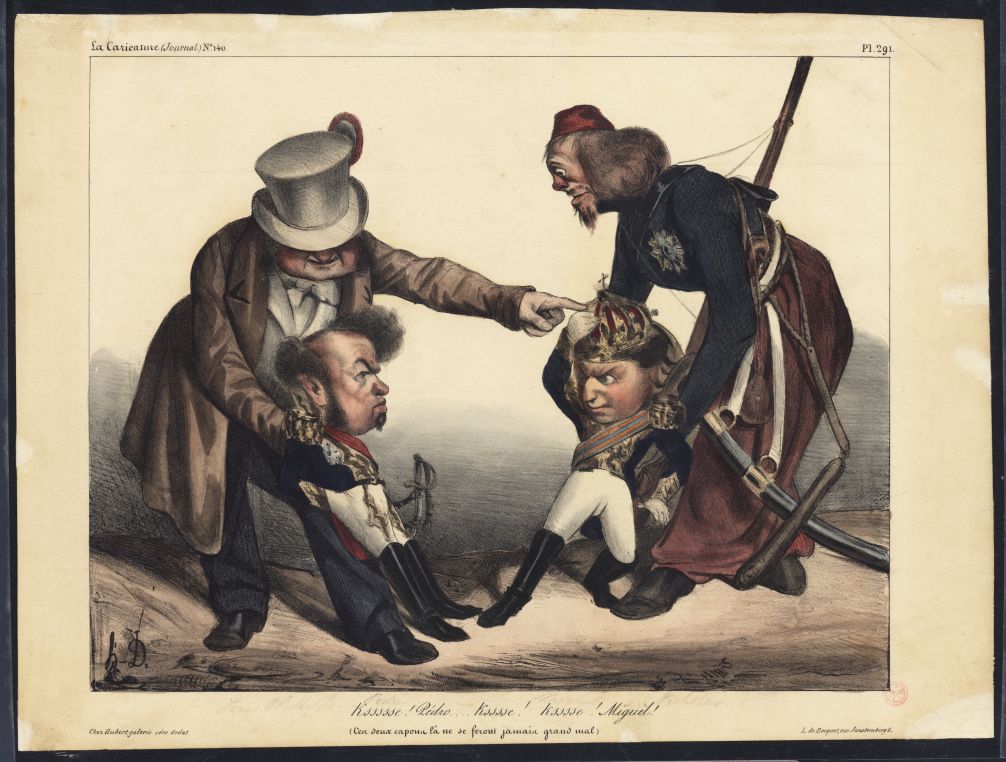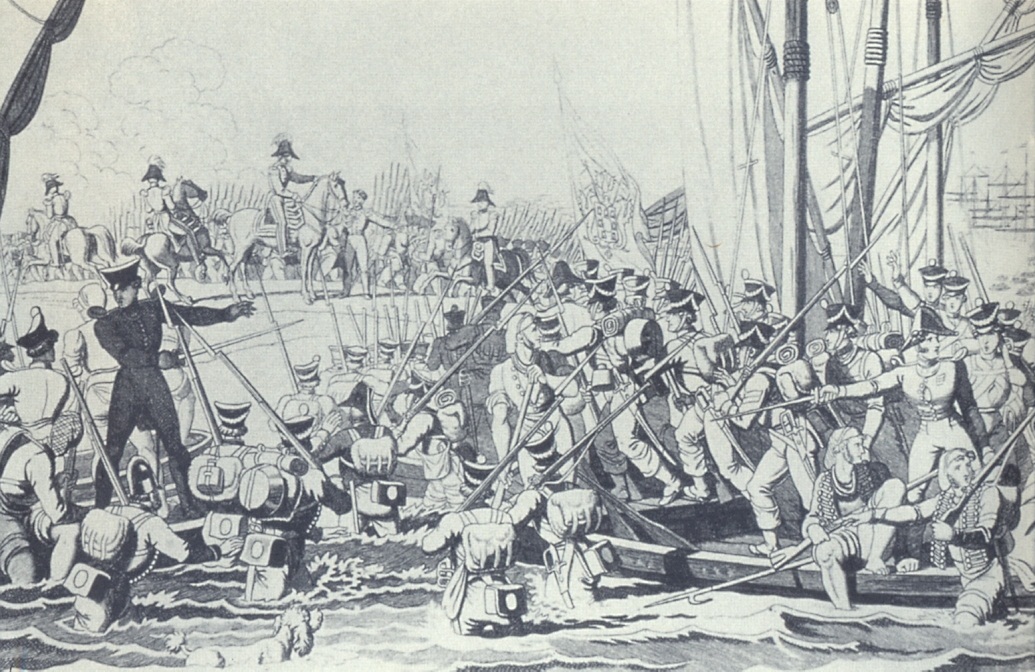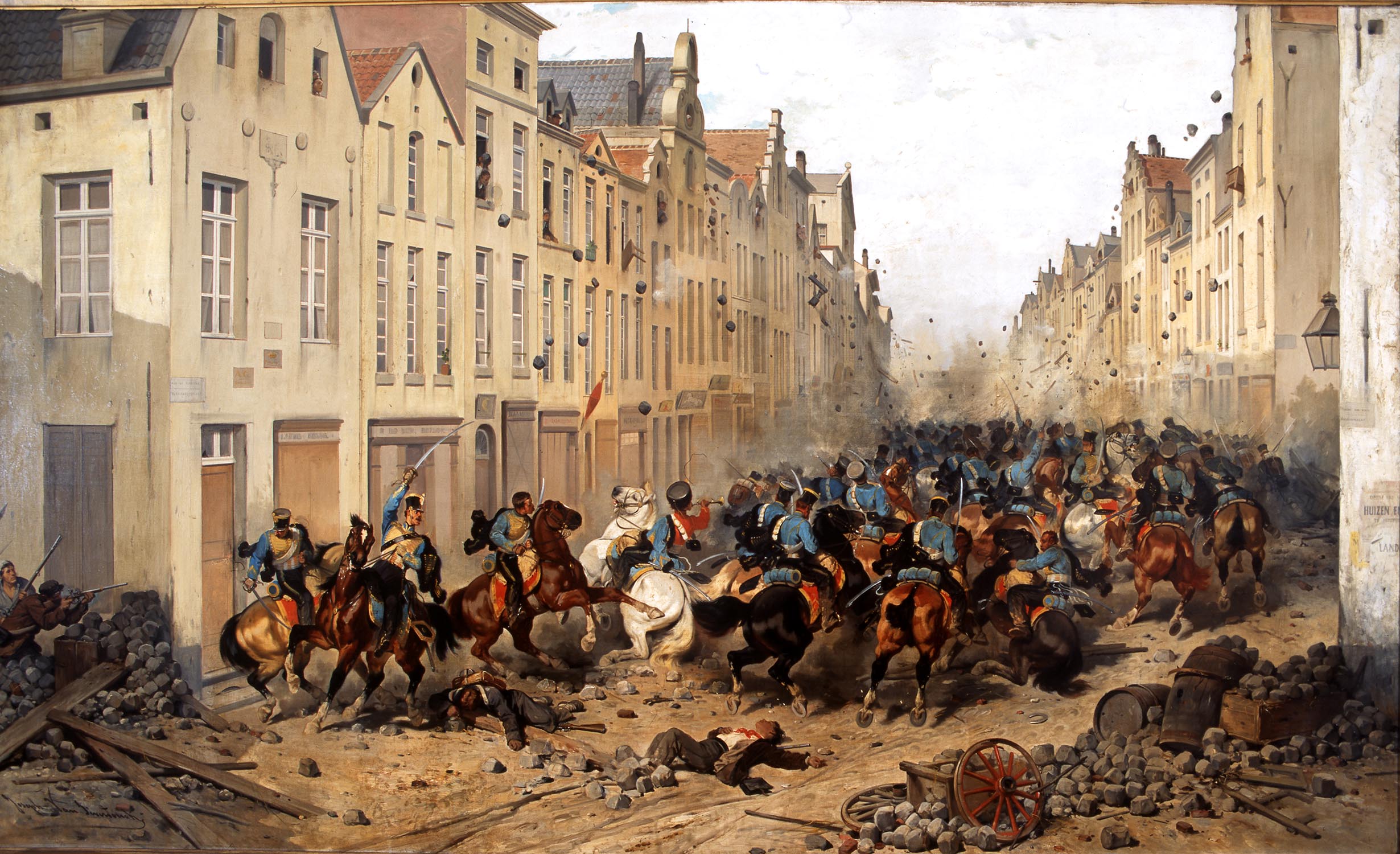|
Quadruple Alliance (1834)
The Quadruple Alliance was a treaty signed between the United Kingdom of Great Britain and Ireland, July Monarchy, Kingdom of France, History of Spain (1808–1874), Spain and Kingdom of Portugal on 22 April 1834, by which the four State (polity), States undertook to expel from Portugal the Infante of Portugal, Portuguese Infante Miguel I of Portugal, Miguel and the Infante of Spain, Spanish Infante Infante Carlos María Isidro of Spain, Carlos. With the beginning of the First Carlist War, Carlist War, additional articles were signed in August of that year, by which the rest of the signatory parties undertook to help the legitimist government in Spain. The treaty was understood by the Austrian Empire, Russian Empire and Kingdom of Prussia, absolutist powers, as a joint diplomatic action in International relations, international politics to defend the Liberalism, liberal models represented by the governments of the Quadruple Alliance. In the practical field, given that France and the ... [...More Info...] [...Related Items...] OR: [Wikipedia] [Google] [Baidu] |
Treaty
A treaty is a formal, legally binding written agreement between sovereign states and/or international organizations that is governed by international law. A treaty may also be known as an international agreement, protocol, covenant, convention, pact, or exchange of letters, among other terms; however, only documents that are legally binding on the parties are considered treaties under international law. Treaties may be bilateral (between two countries) or multilateral (involving more than two countries). Treaties are among the earliest manifestations of international relations; the first known example is a border agreement between the Sumer, Sumerian city-states of Lagash and Umma around 3100 BC. International agreements were used in some form by most major civilizations and became increasingly common and more sophisticated during the Early modern period, early modern era. The early 19th century saw developments in diplomacy, foreign policy, and international law reflected by ... [...More Info...] [...Related Items...] OR: [Wikipedia] [Google] [Baidu] |
Holy Alliance
The Holy Alliance (; ), also called the Grand Alliance, was a coalition linking the absolute monarchist great powers of Austria, Prussia, and Russia, which was created after the final defeat of Napoleon at the behest of Emperor Alexander I of Russia and signed in Paris on 26 September 1815. The alliance aimed to restrain liberalism in Europe in the wake of the devastating French Revolutionary Wars and the Napoleonic Wars; it nominally succeeded in this until the Crimean War. Chancellor Otto von Bismarck managed to reunite the Holy Alliance, as League of the Three Emperors, following the unification of Germany in 1871. However the alliance faltered by the 1880s due to Austrian and Russian conflicts of interest over the decline of the Ottoman Empire. Establishment Apparently, the alliance was formed to instil the divine right of kings and Christian values in European political life, as pursued by Alexander I under the influence of his spiritual adviser Baroness Barbara von Krüd ... [...More Info...] [...Related Items...] OR: [Wikipedia] [Google] [Baidu] |
Liberal Wars
The Liberal Wars (), also known as the Portuguese Civil War () and the War of the Two Brothers () was a civil war in Portugal that lasted from May 1828 to May 1834, fought between liberal progressive constitutionalists (led by former King Pedro IV) and conservative traditionalists (led by King Miguel I) over the country's system of government and royal succession. Embroiled parties included the Kingdom of Portugal, Portuguese rebels, the United Kingdom, France, the Catholic Church, Spain and Russia. Roots of the conflict The death of King John VI in 1826 created a dispute over royal succession. While Dom Pedro, the Emperor of Brazil, was the king's oldest son, his younger brother Miguel contended that Pedro had forfeited his claim to the throne by declaring Brazilian independence and by declaring war on the Kingdom of Portugal, therefore violating the succession rules mentioned in the Fundamental Laws of the Kingdom. Pedro briefly entitled himself King Pedro IV of P ... [...More Info...] [...Related Items...] OR: [Wikipedia] [Google] [Baidu] |
Europe
Europe is a continent located entirely in the Northern Hemisphere and mostly in the Eastern Hemisphere. It is bordered by the Arctic Ocean to the north, the Atlantic Ocean to the west, the Mediterranean Sea to the south, and Asia to the east. Europe shares the landmass of Eurasia with Asia, and of Afro-Eurasia with both Africa and Asia. Europe is commonly considered to be Boundaries between the continents#Asia and Europe, separated from Asia by the Drainage divide, watershed of the Ural Mountains, the Ural (river), Ural River, the Caspian Sea, the Greater Caucasus, the Black Sea, and the waterway of the Bosporus, Bosporus Strait. "Europe" (pp. 68–69); "Asia" (pp. 90–91): "A commonly accepted division between Asia and Europe ... is formed by the Ural Mountains, Ural River, Caspian Sea, Caucasus Mountains, and the Black Sea with its outlets, the Bosporus and Dardanelles." Europe covers approx. , or 2% of Earth#Surface, Earth's surface (6.8% of Earth's land area), making it ... [...More Info...] [...Related Items...] OR: [Wikipedia] [Google] [Baidu] |
Parliament Of The United Kingdom
The Parliament of the United Kingdom of Great Britain and Northern Ireland is the supreme legislative body of the United Kingdom, and may also legislate for the Crown Dependencies and the British Overseas Territories. It meets at the Palace of Westminster in London. Parliament possesses legislative supremacy and thereby holds ultimate power over all other political bodies in the United Kingdom and the Overseas Territories. While Parliament is bicameral, it has three parts: the sovereign, the House of Lords, and the House of Commons. The three parts acting together to legislate may be described as the King-in-Parliament. The Crown normally acts on the advice of the prime minister, and the powers of the House of Lords are limited to only delaying legislation. The House of Commons is the elected lower chamber of Parliament, with elections to 650 single-member constituencies held at least every five years under the first-past-the-post system. By constitutional conventi ... [...More Info...] [...Related Items...] OR: [Wikipedia] [Google] [Baidu] |
Reform Act 1832
The Representation of the People Act 1832 (also known as the Reform Act 1832, Great Reform Act or First Reform Act) was an act of the Parliament of the United Kingdom (indexed as 2 & 3 Will. 4. c. 45), enacted by the Whig government of Prime Minister Charles Grey, 2nd Earl Grey, introducing major changes to the electoral system of England and Wales, expanding the electorate in the United Kingdom. The legislation granted the right to vote to a broader segment of the male population by standardizing property qualifications, extending the franchise to small landowners, tenant farmers, shopkeepers, and all householders who paid a yearly rental of £10 or more. The act also reapportioned constituencies to address the unequal distribution of seats. The act of England and Wales was accompanied by the Scottish Reform Act 1832 and Irish Reform Act 1832, respectively. Before the reform, most members of Parliament nominally represented boroughs. However, the number of electors in a ... [...More Info...] [...Related Items...] OR: [Wikipedia] [Google] [Baidu] |
Whigs (British Political Party)
The Whigs were a political party in the Parliaments of England, Scotland, Ireland, Great Britain and the United Kingdom. Between the 1680s and the 1850s, the Whigs contested power with their rivals, the Tories. The Whigs became the Liberal Party when the faction merged with the Peelites and Radicals in the 1850s. Many Whigs left the Liberal Party in 1886 over the issue of Irish Home Rule to form the Liberal Unionist Party, which merged into the Conservative Party in 1912. The Whigs began as a political faction that opposed absolute monarchy and Catholic emancipation, supporting constitutional monarchism and parliamentary government, but also Protestant supremacy. They played a central role in the Glorious Revolution of 1688 and were the standing enemies of the Roman Catholic Stuart kings and pretenders. The period known as the Whig Supremacy (1714–1760) was enabled by the Hanoverian succession of George I in 1714 and the failure of the Jacobite rising of 1715 ... [...More Info...] [...Related Items...] OR: [Wikipedia] [Google] [Baidu] |
Louis Philippe I
Louis Philippe I (6 October 1773 – 26 August 1850), nicknamed the Citizen King, was King of the French from 1830 to 1848, the penultimate monarch of France, and the last French monarch to bear the title "King". He abdicated from his throne during the French Revolution of 1848, which led to the foundation of the French Second Republic. Louis Philippe was the eldest son of Louis Philippe II, Duke of Orléans (later known as Philippe Égalité). As Duke of Chartres, the younger Louis Philippe distinguished himself commanding troops during the French Revolutionary Wars and was promoted to lieutenant general by the age of 19 but broke with the First French Republic over its decision to execute King Louis XVI. He fled to Switzerland in 1793 after being connected with a plot to restore France's monarchy. His father fell under suspicion and was executed during the Reign of Terror. Louis Philippe remained in exile for 21 years until the Bourbon Restoration in France, Bourbon Restor ... [...More Info...] [...Related Items...] OR: [Wikipedia] [Google] [Baidu] |
Belgian Revolution
The Belgian Revolution (, ) was a conflict which led to the secession of the southern provinces (mainly the former Southern Netherlands) from the United Kingdom of the Netherlands and the establishment of an independent Kingdom of Belgium. The people of the south were mainly Flemish people, Flemings and Walloons. Both peoples were traditionally Roman Catholic as contrasted with Protestant-dominated (Dutch Reformed) people of the north. Many outspoken liberals regarded William I of the Netherlands, King William I's rule as despotic. There were high levels of unemployment and industrial unrest among the working classes. On 25 August 1830, riots erupted in Brussels and shops were looted. Theatergoers who had just watched the nationalistic opera ''La muette de Portici'' joined the mob. Uprisings followed elsewhere in the country. Factories were occupied and machinery destroyed. Order was restored briefly after William committed troops to the Southern Provinces but rioting continued ... [...More Info...] [...Related Items...] OR: [Wikipedia] [Google] [Baidu] |
Congress Of Vienna
The Congress of Vienna of 1814–1815 was a series of international diplomatic meetings to discuss and agree upon a possible new layout of the European political and constitutional order after the downfall of the French Emperor Napoleon, Napoleon Bonaparte. Participants were representatives of all European powers (other than the Ottoman Empire) and other stakeholders. The Congress was chaired by Austrian Empire, Austrian statesman Klemens von Metternich, and was held in Vienna from September 1814 to June 1815. The objective of the Congress was to provide a long-term peace plan for Europe by settling critical issues arising from the French Revolutionary Wars and the Napoleonic Wars through negotiation. The goal was not simply to restore old boundaries, but to resize the main powers so they could European balance of power, balance each other and remain at peace, being at the same time shepherds for the smaller powers. More generally, conservative leaders like Metternich also soug ... [...More Info...] [...Related Items...] OR: [Wikipedia] [Google] [Baidu] |
Revolutions Of 1830
The Revolutions of 1830 were a revolutionary wave in Europe which took place in 1830. It included two "Romantic nationalism, romantic nationalist" revolutions, the Belgian Revolution in the United Kingdom of the Netherlands and the July Revolution in Kingdom of France, France along with rebellions in Congress Poland, Italian states, Kingdom of Portugal, Portugal and Switzerland. It was followed eighteen years later, by another and much stronger wave of revolutions known as the Revolutions of 1848. Romantic revolutions The romantic nationalism, romantic nationalist revolutions of 1830, both of which occurred in Western Europe, led to the establishment of similar constitutional monarchy, constitutional monarchies, called popular monarchy, popular monarchies. Louis-Philippe I became "King of the French" on 31 July 1830, and Leopold I of Belgium, Leopold I became "King of the Belgians", on 21 July 1831. In France In France, the July Revolution led to the overthrow of the House of B ... [...More Info...] [...Related Items...] OR: [Wikipedia] [Google] [Baidu] |
Liberal Wars
The Liberal Wars (), also known as the Portuguese Civil War () and the War of the Two Brothers () was a civil war in Portugal that lasted from May 1828 to May 1834, fought between liberal progressive constitutionalists (led by former King Pedro IV) and conservative traditionalists (led by King Miguel I) over the country's system of government and royal succession. Embroiled parties included the Kingdom of Portugal, Portuguese rebels, the United Kingdom, France, the Catholic Church, Spain and Russia. Roots of the conflict The death of King John VI in 1826 created a dispute over royal succession. While Dom Pedro, the Emperor of Brazil, was the king's oldest son, his younger brother Miguel contended that Pedro had forfeited his claim to the throne by declaring Brazilian independence and by declaring war on the Kingdom of Portugal, therefore violating the succession rules mentioned in the Fundamental Laws of the Kingdom. Pedro briefly entitled himself King Pedro IV of P ... [...More Info...] [...Related Items...] OR: [Wikipedia] [Google] [Baidu] |











